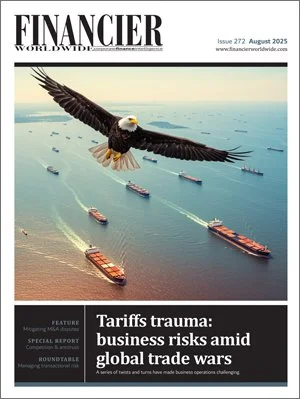FCPA enforcement and compliance
August 2025 | FEATURE | FRAUD & CORRUPTION
Financier Worldwide Magazine
The Foreign Corrupt Practices Act (FCPA) has remained a cornerstone of the United States’ efforts to combat fraud, bribery and corruption. The year 2024 marked a notable period for FCPA enforcement, with overall activity increasing compared to 2023. This rise was primarily driven by a significant uptick in Department of Justice (DOJ) enforcement actions, even as public enforcement actions by the Securities and Exchange Commission (SEC) declined. In total, the DOJ and SEC initiated 26 FCPA-related enforcement actions in 2024, comprising nine corporate resolutions by the DOJ and six by the SEC. The DOJ also brought charges against 19 individuals, while the SEC filed actions against four.
In 2024, the DOJ secured convictions in four trials. Two defendants were found guilty for their involvement in separate bribery schemes linked to state-owned oil and gas companies in Latin America, including Brazil’s Petrobras, Ecuador’s Petroecuador, and PEMEX Procurement International, a subsidiary of Mexico’s PEMEX. These entities have been central to several FCPA investigations in recent years. The remaining two trials involved high-ranking foreign officials from Mozambique and Ecuador.
Additionally, the DOJ’s Criminal Division introduced two pilot programmes in 2024 to encourage corporate self-policing and voluntary disclosure. In August, the DOJ launched the Corporate Whistleblower Awards Pilot Program, aimed at addressing gaps in existing whistleblower frameworks that do not fully encompass the range of corporate crimes investigated by the DOJ. In September, the DOJ also updated its Evaluation of Corporate Compliance Programs, with some revisions specifically targeting emerging risks associated with artificial intelligence.
Overall, 2024 witnessed the highest level of publicly disclosed FCPA enforcement activity since 2020, although it still fell short of the peak levels observed in 2016. The increase from 2023 was largely attributable to the rise in individual prosecutions. While corporate enforcement actions by the SEC declined, both the DOJ and SEC pursued more cases against individuals than in the previous year, reversing a multi-year downward trend.
Legal uncertainty following reversal on FCPA enforcement
Despite the significant FCPA enforcement activity in 2024, the Trump administration in early 2025 executed a dramatic policy reversal that has redefined the enforcement landscape. In line with broader administrative priorities, these changes are expected to significantly impact non-US companies, particularly those based in Europe. Most notably, the administration has shifted FCPA enforcement priorities away from bribery and corruption, focusing instead on cartels and transnational criminal organisations. It has also threatened enforcement action against diversity, equity and inclusion initiatives, which it has declared unlawful, and has introduced increased tariffs.
On 10 February 2025, President Trump signed an executive order instructing the US attorney general to pause enforcement of the FCPA. The order directed the attorney general to issue updated enforcement guidelines that “promote the President’s Article II authority to conduct foreign affairs and prioritise American interests, American economic competitiveness with respect to other nations, and the efficient use of Federal law enforcement resources”. This executive order followed a series of memoranda issued by Pamela Bondi, attorney general, on 5 February 2025, including one titled ‘Elimination of Cartels and Transnational Criminal Organizations’, which outlined a redirection of enforcement priorities.
“There is growing ambiguity around how the DOJ will handle ongoing and future FCPA investigations and prosecutions, particularly whether enforcement will increasingly target non-US companies and individuals.”
The executive order asserts that the FCPA has been “systematically” and “to a steadily increasing degree” stretched beyond its intended scope, harming US interests by obstructing foreign policy and national security objectives. It claims that enforcement has impeded the ability of US companies to gain strategic advantages in areas such as critical minerals, deep-water ports and other key infrastructure. The order further argues that “overexpansive and unpredictable” FCPA enforcement has penalised American businesses for routine practices abroad, thereby undermining economic competitiveness.
Accordingly, the executive order mandates a 180-day review period – extendable by an additional 180 days – during which the attorney general must: review existing FCPA enforcement guidelines and policies; halt the initiation of new FCPA investigations or enforcement actions unless specifically authorised; assess ongoing investigations and take action consistent with the order’s objectives; and issue revised enforcement guidelines. It also stipulates that any future FCPA action must be explicitly authorised by the attorney general, who may also determine whether remedial measures are warranted in relation to past enforcement actions.
This shift has raised concerns among legal experts, compliance officers and international watchdogs, who fear that the rollback could embolden corrupt practices and weaken global anti-bribery norms. Critics argue that the move undermines decades of progress in international cooperation on anti-corruption enforcement, particularly within frameworks such as the OECD Anti-Bribery Convention. There is also growing apprehension that the pause may create a fragmented enforcement environment, where multinational corporations face inconsistent expectations depending on jurisdiction. For companies operating across borders, this could increase legal complexity and compliance costs, as they attempt to navigate diverging regulatory regimes.
As of now, the DOJ has not released updated FCPA enforcement guidance. However, its actions in several publicly charged cases suggest varying interpretations of the executive order. In one instance, the DOJ dismissed an indictment against two US citizens – former executives of a US technology firm – who had been charged with FCPA violations. In contrast, it filed ‘notices of authorization’ to proceed to trial in three other FCPA cases, two of which involve allegations that US employees paid bribes to foreign officials to secure business for their companies. These differing outcomes indicate that the DOJ is not applying a blanket policy of declining all FCPA cases involving US entities or individuals.
Global ripple effects
The diverging approaches to FCPA enforcement are creating considerable uncertainty for companies and compliance professionals. There is growing ambiguity around how the DOJ will handle ongoing and future FCPA investigations and prosecutions, particularly whether enforcement will increasingly target non-US companies and individuals.
In the short to medium term, the pause in enforcement is likely to complicate compliance efforts. Nevertheless, it remains essential for companies engaged in international operations – especially in jurisdictions with a high risk of bribery and corruption – to remain vigilant. The executive order does not appear to affect the SEC’s authority to enforce the FCPA’s accounting provisions. These provisions require US issuers to maintain accurate books and records and implement internal controls to prevent the concealment of illicit payments. Moreover, any misconduct occurring during the pause may still be subject to investigation or enforcement under a future administration with different priorities.
The implications of the pause extend beyond the US. Other national enforcement bodies may respond by intensifying their own anti-corruption efforts. In the immediate aftermath of the executive order, the UK Anti-Corruption Coalition issued a statement describing the pause as “a major blow to the international fight against corruption”. The coalition urged the UK government to take several steps, including forming a coalition of European Union, Commonwealth and Global South countries to uphold anti-corruption norms; engaging the Trump administration on the risks of undermining the OECD Anti-Bribery Convention; increasing support for the OECD Working Group on Bribery and the United Nations Convention Against Corruption; and strengthening the Serious Fraud Office (SFO) and National Crime Agency to enhance global enforcement capacity.
In March 2025, the UK, France and Switzerland launched the International Anti-Corruption Prosecutorial Taskforce, comprising the SFO, France’s National Financial Prosecutor’s Office, and the Office of the Attorney General of Switzerland. The taskforce was created to reinforce the jurisdictions’ shared commitment to combatting international bribery. Commenting on the initiative, the Director of the SFO stated: “The commitment we have made today reaffirms our… commitment to tackling… international bribery and corruption, wherever it occurs. We will make use of every power and partnership available.” According to the taskforce, the three countries will “stand firm” in their commitment to tackling bribery and corruption within national and international legal frameworks. Companies operating within these jurisdictions, including US firms with European operations, should therefore continue to maintain robust anti-corruption compliance programmes.
In addition to these developments, several international non-governmental organisations and transparency watchdogs have voiced concern. Some have called for the establishment of a new multilateral anti-corruption body to fill the leadership vacuum left by the US. Others have urged the European Union to adopt a more assertive stance, including the possibility of harmonising anti-bribery laws across member states to ensure consistent enforcement. These discussions reflect a growing recognition that the global anti-corruption framework may need to evolve in response to shifting geopolitical dynamics.
Regardless of the Trump administration’s pause, anti-corruption programmes should remain in place. The FCPA remains valid US law, and its enforcement could resume under a future administration. However, the current halt in new investigations and enforcement actions will likely reduce the prosecution and penalisation of bribery and corruption by US entities abroad. This diminished scrutiny may, in turn, embolden some organisations to engage in corrupt practices.
Despite efforts by the UK and other jurisdictions to uphold global enforcement standards, the executive order is expected to have a destabilising effect on international anti-corruption efforts. The US now stands apart from other nations and the broader framework of international anti-bribery legislation. This marks a significant departure from the previous status quo, in which the US, through the FCPA and its active role in the OECD, played a central role in setting global anti-corruption standards. Alarmingly, the revised enforcement guidelines prioritise US economic interests over anti-corruption objectives, potentially violating article 5 of the OECD Convention on Combating Bribery of Foreign Public Officials in International Business Transactions.
There is also growing concern about the implications for whistleblowers in the US. Whistleblowers already face considerable risks of retaliation, and with the US appearing to retreat from international cooperation on anti-corruption enforcement, individuals may become increasingly reluctant to report misconduct. This chilling effect could further undermine global efforts to detect and deter corruption.
Staying vigilant: compliance amid shifting enforcement landscapes
Looking ahead, many questions remain about the future of the FCPA in the US. Meanwhile, the international community appears poised to fill some of the void left by the slowdown in US enforcement. The creation of the International Anti-Corruption Prosecutorial Taskforce may signal a growing willingness among other jurisdictions to step forward and assert leadership in global anti-corruption efforts. Whether European authorities will be granted the necessary tools and resources to expand the reach of their own anti-corruption laws, however, remains uncertain.
Although the pause represents a significant shift in the global fight against bribery and corruption, it does not amount to a complete abandonment of FCPA investigations and enforcement by US authorities. Given the readiness of other jurisdictions to act, multinational companies must continue to maintain robust, well-designed and well-resourced anti-corruption compliance programmes. It is essential that these programmes are tailored to the legal, compliance and cultural risks relevant to each company’s operations.
It is still early in the second Trump administration, and the medium- to long-term consequences of the US policy shift on global anti-corruption enforcement are yet to be fully understood.
Nonetheless, the pause in FCPA enforcement is already having significant international repercussions. In the interim, companies should carefully review and, where necessary, enhance their anti-bribery and corruption compliance frameworks. This includes reassessing risk profiles, updating policies and procedures, and ensuring that training programmes remain effective and current. Companies must also remain agile and responsive to any future policy changes in the US or other key jurisdictions.
© Financier Worldwide
BY
Richard Summerfield


